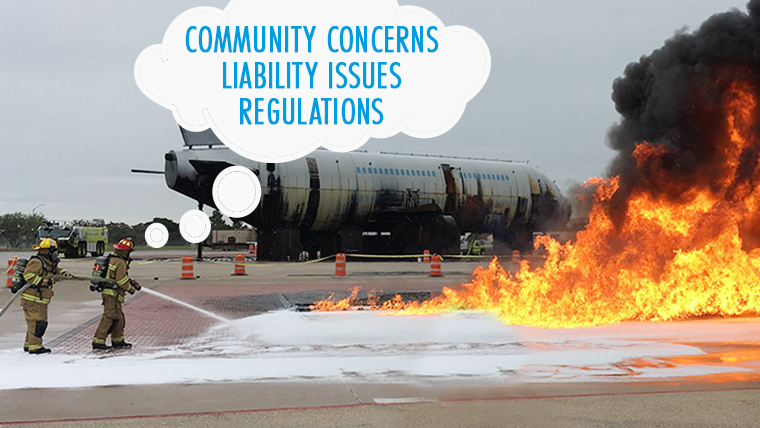PFAS contamination has gained a lot of public concern across the country due to growing evidence of the effects of these chemicals on human health and the environment. Airports are at potential risk for PFAS contamination because they use Aqueous Film Forming Foam (AFFF) containing PFAS surfactants. The situation for airports is complicated, due to community concerns, liability issues, and the need to meet regulatory requirements. This is compounded by the fact that scientific knowledge about PFAS compounds and engineering solutions are not yet fully developed.
Airports dealing with PFAS contamination may face a relatively assertive regulatory environment, aggressive media coverage, and acute community awareness and concern. Considering relevant factors early in an airport’s investigation can help avoid or minimize these issues.
Factors to consider include:
Public Relations – PFAS is a hot topic in the news. If you start to investigate PFAS on your airfield, you should plan to be contacted by the media for additional details. Therefore, an effective public communications strategy to inform the public, respond to inquiries, and prepare for additional outreach activities is a good idea. This may require advance coordination with your public relations department or an outside public relations firm.
Legal Counsel – Regulatory requirements, legal liability, and community sensitivity towards PFAS contamination means that airports should consult with an attorney, ideally with experience in PFAS contamination at airports. This may require consultation with outside legal counsel.
Regulatory Reporting Requirements – An airport may be required to report the findings of a PFAS investigation and sharing this information can come with implications. Test data submitted to a regulatory agency can become available to the public through a Freedom of Information Act (FOIA) request. An airport should carefully design its data collection activities, critically evaluate the test results, and resolve any quality assurance issues prior to their submittal. They should also prepare in advance for potential follow-up actions from regulatory agencies.
Potential Remediation Actions – When they receive the test data, a regulatory agency may require an airport to implement remediation for areas (soil, ground water, etc.) found to have PFAS contamination. This may include:
- Cleanup/control of contaminated soil & sediments
- Treating contaminated groundwater and drinking water aquifers
- Implementing drinking water filtration systems for off-airport locations affected by PFAS contamination which could include:
- Installing filtration systems at residences/businesses with well water contaminated with PFAS.
- Connecting residences/businesses to public drinking water systems.
Complying with a required action could involve a costly multi-year remediation effort. Currently, PFAS contamination remediation is not listed as an eligible item for Federal Aviation Administration (FAA) funding. Because of this, it is critically important that remediation strategies and implementations are completed thoroughly.
How Can Mead & Hunt Help?
Airports need a strategic, methodical scientific approach in addressing potential PFAS contamination. This typically involves phases of investigation that focus on answering well-defined questions, and only drawing conclusions that are supported by available, often limited information. Establishing a public relations strategy that includes educating the community, a relationship of trust with regulatory agencies, and input from legal counsel in the decision-making process is also key to success.
Mead & Hunt can help airports develop a site-specific approach in investigating PFAS that includes these investigation considerations. Through connections Mead & Hunt has established in the industry, we can offer recommendations for legal firms that have experience assisting airports with assessing, investigating, and remediating PFAS contamination, as well as public relation firms that have experience communicating about PFAS contamination at airports. Our team also has experience in public relations messaging, and we can help develop an effective strategy to be implemented during and after the investigation process. We can also help develop an effective remediation strategy that meets realistic regulatory and community expectations while remaining financially feasible.


